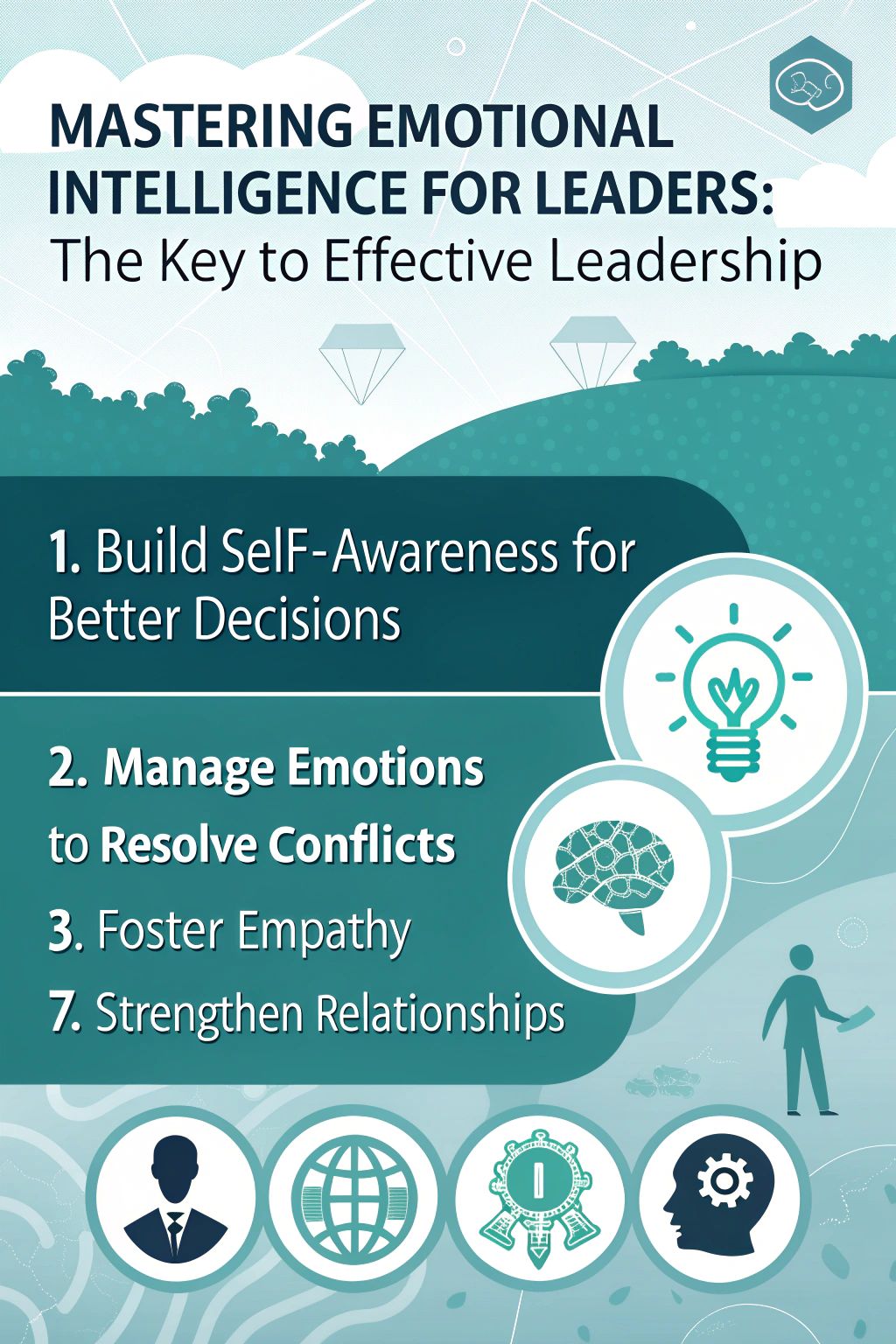Leaders often face a big problem: how to lead their teams well. They want to bring out the best in people, solve problems, and make good decisions. One key skill can help with all of this: emotional intelligence for leaders.
It’s about knowing your feelings and other people’s too. This helps you work better with others.
A fact that stands out is that 71% of employers think emotional intelligence is more important than being good at specific tasks. Our article shows you why emotional intelligence matters for leadership and how it can make you a better leader.
We’ll look at its main parts, such as understanding yourself, managing feelings, knowing what others feel, and handling relationships well.
Don’t miss this guide on leading with emotion.

Defining Emotional Intelligence in Leadership

Comprehending and handling your own feelings defines emotional intelligence in leadership, as does perceiving the emotions of others. This skill is a primary factor in successful leadership.
The concept of emotional intelligence was initially introduced in 1990 by John Mayer and Peter Salovey. In the subsequent decade, psychologist Daniel Goleman popularised it for leaders.
His research featured in a Harvard Business Review article from 1998, which highlighted the significant role high emotional intelligence plays in successful leadership.
Emotional intelligence comprises four components: self-awareness, self-management, social awareness, and relationship management. Leadership infused with emotional intelligence requires a clear understanding of one’s own strengths and weaknesses, along with the ability to regulate impulses.
Recognising diverse viewpoints is also necessary since it fosters improved team relationships. A study by TalentSmart revealed that EQ is the prime predictor of job performance.
Importance of Emotional Intelligence for Effective Leadership
Emotional intelligence is vital for effective leadership as it improves team management, enhances conflict resolution, and nurtures a collaborative work environment. Leaders who possess high emotional intelligence are better equipped to understand their team’s emotions, navigate interpersonal relationships effectively, and inspire positive outlooks within the workplace.
Enhances team management
Leaders with exceptional emotional awareness cultivate teams that remain composed even in stressful situations. Their expertise in emotion regulation enhances job contentment and efficiency.
They possess the inherent quality of viewing the world from their team’s perspective – a trait often regarded as empathy. This ability aids them in establishing more profound connections with each member.
A brilliant leader applies emotional understanding to foster faith within their team. When each individual feels appreciated and recognised, they perform more cohesively. This method lessens tension and heightens employee involvement considerably.
Data suggests that for 71% of employers, emotional understanding is more impactful than technical abilities during recruitment, given its significant contribution to boosting team coordination and overall company performance.
Boosts conflict resolution
Emotional intelligence plays a critical role in solving conflicts at work. Leaders with high emotional intelligence can see problems from different viewpoints. They listen well and understand others’ feelings.
This way, they spot conflicts early and deal with them before they grow. A leader who manages their emotions keeps calm during disagreements, which helps to resolve issues more smoothly.
Unsolved disputes waste about eight hours of company time, showing how important quick resolution is. High emotional intelligence enables leaders to handle workplace misunderstandings better, preventing them from turning into bigger problems.
This skill helps to build trust among team members and improves the overall working atmosphere, making it easier for everyone to focus on their goals rather than getting stuck in endless disputes.
Fosters a collaborative work environment
Leaders exhibiting strong emotional intelligence foster a favourable atmosphere within their organisations. Their adept team management skills enhance team dynamics and inspire collective efforts.
Conversely, a leader deficient in emotional intelligence may witness an increased rate of staff attrition or disengagement. Conversely, those who have honed this talent can significantly improve their employees’ job satisfaction.
Such leadership ensures every individual feels recognised and comprehended. This leads to superior problem resolution and innovation as diverse thoughts coalesce seamlessly. Leaders evolve into links, transcending their traditional role as bosses.
They transform workplaces into environments where individuals are driven to share and contribute voluntarily. Such conduct directly and positively influences productivity and organisational triumph.
Core Components of Emotional Intelligence
Mastering emotional intelligence for leaders requires a thorough grasp of its core components. These encompass self-awareness, self-regulation, social understanding, and relationship management.
You can explore these crucial elements further to improve your leadership effectiveness and make a constructive influence on your team’s performance.
For additional in-depth information on mastering emotional intelligence in leadership, please visit the complete blog post!
Self-Awareness
Self-awareness stands as a pillar in the foundation of emotional intelligence. Leaders with high self-awareness understand their strengths, weaknesses, and how their emotions affect others.
They navigate the complexities of leadership by recognising their own emotional states. This ability is not common. Research by Tasha Eurich found that only 10–15% of people are truly self-aware, even though 95% believe they are self-aware.
To assess and improve self-awareness, leaders often use tools like 360-degree feedback. This method gathers insights about a leader’s behaviour from peers, managers, and direct reports.
It helps leaders see themselves through others’ eyes, revealing blind spots they may not have noticed. Such practices empower leaders to lead with emotional intelligence by fostering better decision-making and relationships within the company.
Self-Management
Self-Management holds a commanding position in leadership. Leaders need to regulate their emotions, notably under strain. This ability prevents them from taking rushed decisions. Alternatively, they offer due thought before proceeding.
Able leaders take a moment to analyse their sentiments. This method aids them in making judicious responses, not impulsive ones.
This element of emotional intelligence is significant for efficient leadership. Appropriate handling of emotions leads to superior problem-solving and decision-making. Leaders who are adept at self-management keep an optimistic perspective even in tense circumstances.
They become a model for others by dealing with stress effectively and maintaining motivation.
Social Awareness
Social awareness is a key part of emotional intelligence. It means knowing what’s happening in groups or the whole company. Leaders with this skill see how emotions affect work and relationships.
They use empathy to understand everyone’s views and needs. This supports teamwork and performance. Empathic leaders are 40% better at coaching and making decisions.
This skill also helps spot workplace dynamics that others might miss. These leaders keep morale high by recognising when people need support or encouragement before problems start, ensuring a positive environment for all.
Relationship Management
An essential component of emotional intelligence in leadership is effective relationship management. Building and maintaining positive connections with their team members is crucial for leaders with strong relationship management skills, as it fosters trust and cooperation.
This skill is vital for resolving conflicts, influencing others positively, and creating a harmonious work environment. Studies have shown that leaders who demonstrate empathy and active listening are more successful in managing relationships within the workplace.
Significantly, addressing the emotional needs of employees plays a noteworthy role in effective relationship management. A survey by the Society for Human Resource Management found that 72% of employees consider respectful treatment as crucial for job satisfaction.
By understanding and acknowledging the emotions of team members, leaders can enhance their ability to manage relationships effectively, improving overall team performance and well-being.
Strategies to Enhance Emotional Intelligence
To boost emotional intelligence, leaders can engage in self-evaluation and acknowledge emotions, enhance self-control and impulse management, cultivate empathy and comprehension of others, and also focus on improving social skills. Through prioritising these approaches, leaders can effectively raise their emotional intelligence to navigate intricate workplace dynamics and guide their teams towards success.
Self-assessment and recognising emotions
Improving emotional intelligence begins with self-assessment. By reflecting on emotions and decisions through techniques like journaling, individuals can gain clarity on their own emotional states and triggers.
This process aids in recognising emotions not just within oneself, but also in others, forming a foundation for empathy and understanding. Undertaking 360-degree assessments provides valuable feedback, enhancing one’s awareness of how emotions impact interactions and decision-making.
Emotional intelligence is pivotal for effective leadership and team dynamics as it fosters an environment where individuals feel understood and valued. By honing the skill of recognising emotions in oneself and others, leaders can create a more cohesive work culture built on trust and mutual respect.
Improving self-regulation and impulse control
Additionally, As a crucial aspect of emotional intelligence for effective leadership, self-regulation and impulse control are important. Leaders who can effectively regulate their emotions and impulses are better equipped to make rational decisions, especially under pressure.
One strategy to enhance self-regulation is through mindfulness practices that help leaders become more aware of their emotional triggers and responses. By developing the ability to stay calm in challenging situations, leaders can set a positive example for their team members and foster a harmonious work environment.
Moreover, implementing techniques such as deep breathing exercises or taking short breaks when feeling overwhelmed can help manage impulsive reactions. By improving self-regulation and impulse control, leaders can effectively navigate workplace conflicts and maintain a composed demeanour even in high-stress scenarios.
This is essential for inspiring confidence in team members while promoting a culture of resilience within the organisation.
Developing empathy and understanding others
Developing empathy and understanding others is crucial for effective leadership. DDI has reported empathy as the top leadership skill, enabling leaders to comprehend their team members’ perspectives and needs better.
Leaders who show empathy are perceived as high performers by superiors, demonstrating the significant impact of empathy on leadership effectiveness. It nurtures a collaborative work environment and improves team management, allowing leaders to form deeper connections with their employees.
Recognising emotions in oneself and others is a practical step towards mastering emotional intelligence for effective leadership.
Furthermore, grasping others’ viewpoints enables leaders to uphold positive relationships through relationship management and social awareness, essential elements of emotional intelligence.
It helps them to resolve conflicts effectively by considering different perspectives and building trust within their teams. Ultimately, developing empathy significantly contributes to creating a supportive organisational culture that promotes employee engagement and retention while also enhancing performance metrics within companies.
Enhancing social skills
Enhancing social skills is crucial for effective leadership, as it nurtures strong team dynamics and productive work relationships. Leaders with well-developed social skills can effectively communicate, collaborate, and resolve conflicts within their teams.
This leads to a more cohesive and harmonious work environment, resulting in improved productivity and employee satisfaction.
By refining these social skills through training programmes or workshops offered by renowned institutions such as the Centre for Creative Leadership (CCL), leaders can enhance their ability to understand others’ perspectives, build trust, and create a positive workplace culture.
Furthermore, leaders who exhibit high levels of emotional intelligence are known to show more empathy towards their direct reports, ultimately contributing to higher levels of employee retention and organisational success.
Emotional Intelligence for Dummies
Moreover: Leadership development organisations like CCL have shown over 50 years of experience in serving two-thirds of the Fortune 1000 companies—a testament to the significance placed on emotional intelligence in real-world applications.
Daniel Goleman’s assertion in *Harvard Business Review* that effective leaders share high emotional intelligence further highlights its impact on organisational culture and performance.
The ability to inspire through communication lies at the heart of emotionally intelligent leadership—making it an essential component for becoming a more effective leader.
Real-World Applications of Emotional Intelligence in Leadership
Effective leaders understand the significance of emotional intelligence in workplace scenarios. By incorporating emotional intelligence into their leadership approach, they can enhance team dynamics, resolve conflicts, and foster a collaborative work environment.
These practical applications demonstrate how emotional intelligence directly influences leadership effectiveness.
Case studies of successful leaders
Case studies of successful leaders provide real-world evidence of the impact emotional intelligence (EI) has on leadership effectiveness. For instance, Goleman’s pivotal 1998 *Harvard Business Review* article highlighted that high EI is vital for effective leadership, and it remains fundamental in understanding the power of emotional intelligence in successful leadership.
Research further connects empathy in leadership with higher employee engagement and performance, shining a light on how emotionally intelligent leaders drive better organisational outcomes.
One case study illustrates how an executive’s self-awareness and empathy improved their team’s morale and productivity within a large corporation. By recognising emotions and enhancing social skills, they maintained a positive outlook amidst challenges, highlighting the significance of core components like self-management and relationship management within emotional intelligence for exceptional leadership.
These practical instances establish that mastering emotional intelligence equips leaders with abilities critical for success as they navigate complex organisational dynamics.
Impact on organisational culture and performance
Moreover, leaders with high emotional intelligence (EI) notably influence organisational culture and performance. Research has shown that EI fosters trust, accountability, and emotional regulation in the workplace.
This has a direct correlation to cultivating an inclusive and positive work environment, where employees feel valued and understood. A study by Harvard Business Review found that disengaged employees can become liabilities, leading to low productivity and dissatisfaction.
Besides, leaders who demonstrate high EI are better equipped to manage conflicts effectively, boosting overall team management which directly impacts organisational performance.
Positive emotions associated with high EI broaden thinking capabilities while fostering resilience within individuals and teams alike. On the other hand, negative emotions serve as indicators for learning opportunities within a team or organisation.
It’s evident that leaders who possess strong emotional intelligence are better positioned to navigate complex scenarios with increased empathy and understanding of their team members’ perspectives – all critical factors in shaping a resilient organisational culture.
In the journal ‘Industrial Psychology’, managers who exhibit more empathy towards their direct reports are viewed as better performers across various industries such as Fortune 500 companies.
Consequently, this underscores the significant impact of emotional intelligence on driving positive cultural changes within organisations whilst enhancing overall performance levels.
Conclusion
Mastering emotional intelligence is crucial to effective leadership. Comprehending and regulating one’s emotions, and understanding and influencing those of others, are vital abilities for leaders.
By refining key aspects such as self-awareness, self-control, social awareness, and relationship management, leaders can improve team performance and foster a collaborative work environment.
Employers increasingly prioritise emotional intelligence over technical skills in job candidates; it cultivates a positive organisational culture and decision-making. Leaders with high EQ tend to stay composed under pressure and demonstrate empathy towards colleagues.
Developing emotional intelligence is not just important – it’s essential for ensuring leadership effectiveness. To sum up, mastering emotional intelligence is not merely a desirable trait; it’s essential to becoming a successful leader in today’s competitive digital world.
For a more introductory exploration into this subject, consider reading our guide on emotional intelligence for beginners.
MindOwl Founder – My own struggles in life have led me to this path of understanding the human condition. I graduated with a bachelor’s degree in philosophy before completing a master’s degree in psychology at Regent’s University London. I then completed a postgraduate diploma in philosophical counselling before being trained in ACT (Acceptance and commitment therapy).
I’ve spent the last eight years studying the encounter of meditative practices with modern psychology.

